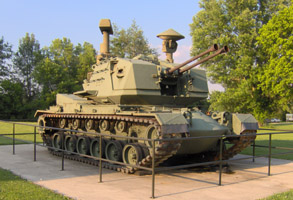
M247 Sergeant York Divisonal Air Defense (DIVAD) Vehicle
Country of Origin: United StatesImage courtesy of Wikipedia (Brian Stansberry); click on image to display larger version

|
M247 Sergeant York Divisonal Air Defense (DIVAD) VehicleCountry of Origin: United StatesImage courtesy of Wikipedia (Brian Stansberry); click on image to display larger version |
| Specifications | |
| Type: Tracked air defense vehicle | Manufacturer: Ford Aerospace |
| Armor Material: Cast and rolled steel | Armor Thickness: Maximum of 120mm |
| Height: 3.42 m | Length: 7.67 m |
| Weight: 54.4 tons | Maximum Speed: 48 kph on-road |
| Powerplant: Teledyne Continental AVDS-1790-2D diesel | Horsepower: 750 hp |
| Description | |
| Size: 13 | Total Actions: 2 |
| Offense | |||||||||||||
| Weapon | Code | Arc | S | M | L | EX | Acc | FC | Dam | Qty | ROF | Special | Ammo |
| Bofors L70 40mm antiaircraft gun | HAAC | T | 3 | 6 | 12 | 24 | 0 | 0 | x12 | 2 | 0 | - | 290 each |
| Defense | |
| Primary Movement: Ground 3/5 (30 kph) | Secondary Movement: N/A |
| Maneuver: -3 | Armor: 12 / 24 / 36 |
| Miscellaneous | |
| Crew: 3 (Driver, Commander, Gunner) | Deployment Range: 500 km |
| Sensors: 0 / 3 km | Communications: +1 / 20 km |
| Perks: Backup Sensors, ECCM (Rating 1, AUX), Smoke Launchers (12 shots, AUX) | Flaws: Defective Active Sensors (Rating 2), Defective Fire Control (Rating 2), Large Sensor Profile (Rating 2) |
| Defects: None | Lemon Dice: 1 |
| Notes | |
|
The Sergeant York became a running joke in the early 1980's about how not to develop a weapons system. The M48A5 chassis, the Bofors cannon and the fire control radar (adapted from the radar built for the F-16 Fighting Falcon) were all successful individually, but the attempt to combine them into a functioning platform failed in a very public fashion. The Wikipedia article on the Sergeant York gives a very good account on the difficulties surrounding the system, which was cancelled in 1985 after the production of only 50 units. |
|